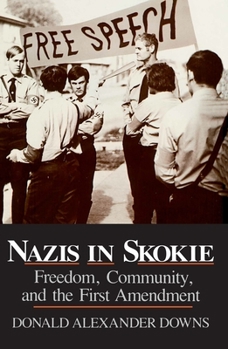Nazis in Skokie: Freedom, Community and the First Amendment
Select Format
Select Condition 
Book Overview
In 1977, a Chicago-based Nazi group announced its plans to demonstrate in Skokie, Illinois, the home of hundreds of Holocaust survivors. The shocked survivor community rose in protest and the issue went to court, with the ACLU defending the Nazis' right to free speech. The court ruled in the Nazis' favor. According to the "content neutrality doctrine" governing First Amendment jurisprudence, the Nazis' insults and villifications were "neutral"--not the issue, as far as the law was concerned. But to Downs, they are at issue. In Nazis in Skokie he challenges the doctrine of "content neutrality" and presents an argument for the minimal abridgment of free speech when that speech in intentionally harmful. Draawing on his interviews with participants in the conflict, Downs combines detailed social history with informed legal interpretation in a provocative examination of an abiding tension between individual freedom and community integrity, and between procedural and substantive justice.
Format:Paperback
Language:English
ISBN:0268014620
ISBN13:9780268014629
Release Date:March 1985
Publisher:University of Notre Dame Press
Length:240 Pages
Weight:0.78 lbs.
Dimensions:0.5" x 6.0" x 9.0"
Customer Reviews
1 rating
For anyone with an open mind
Published by Thriftbooks.com User , 24 years ago
This is a great account of the struggle between the town of Skokie, Illinois and the Nazis whom the town wanted to prevent from holding a rally. It gives an inside look at all the major (and some minor) players in this dramatic sequence of events and the conflicts that many of them faced. The really great thing about this book, though, is that it's not the standard ACLU dogma of "we have to protect Nazis or the 1st Amendment is meaningless." Downs shows that there are genuine issues working against unfettered free speech. Interestingly enough, though, when I finished the book, I had come to feel more strongly than I did when I started that the town was wrong. Approach this book with an open mind and you may be surprised how you feel at the end.





